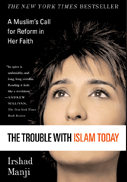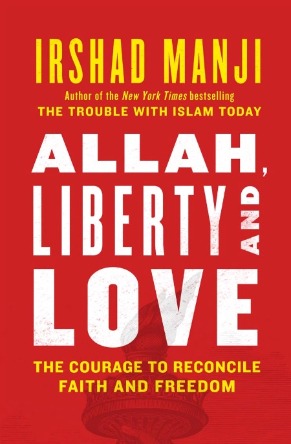 It all began with a segment on CSpan’s Book TV. Irshad Manji was speaking on “Islam in America: The Next 10 Years” with John Avlon. She was voicing some concepts that truly appealed to me, starting with the fact that it is up to Muslims to “save” Islam from the fiery furnace of Islamophobia and the aftermath of 9-11. At the same time, Manji seeks to enlighten non-Muslims to help them to understand how Islam has become the huge tableau of contradictions that we from the outside, have come to know. The word “Islam” means voluntary submission to God, yet martyrs destroy others along with themselves; family is prized, yet a daughter who steps out of orthodox line can lose her life to her own blood relatives; prayer is sacrosanct, but for many bathed in such strict ritual that it does not lift the spirit.
It all began with a segment on CSpan’s Book TV. Irshad Manji was speaking on “Islam in America: The Next 10 Years” with John Avlon. She was voicing some concepts that truly appealed to me, starting with the fact that it is up to Muslims to “save” Islam from the fiery furnace of Islamophobia and the aftermath of 9-11. At the same time, Manji seeks to enlighten non-Muslims to help them to understand how Islam has become the huge tableau of contradictions that we from the outside, have come to know. The word “Islam” means voluntary submission to God, yet martyrs destroy others along with themselves; family is prized, yet a daughter who steps out of orthodox line can lose her life to her own blood relatives; prayer is sacrosanct, but for many bathed in such strict ritual that it does not lift the spirit.
How do I, a non-Muslim (and really a non-religious person to boot), interpret these dichotomies? I have been granted access to information that was there all along, but the privilege of having my study researched, dissected and laid out for me is my good fortune. Up until 9-11, I had not given Muslims any more attention (or lack of attention) than any other group of people – I have always strived to be respectful of the outlook of others, even when they differ from mine. At the root of all faiths, I know, is love, and that was enough for me. But what to do when dramatic evidence is contrary to what I know in my heart?
 Facts, in this case, are my friends. So I began seeking. I sought out Muslim-run web sites online and downloaded a copy of the Holy Qur’an (Koran) to locate passages within their contexts (and obtained translations online); I followed news stories about Muslims around the world who are decidedly NOT terrorists. I promoted to all who would read and listen, those Muslims who bravely stand up to fundamentalist rulers, whether they lead countries or communities. But for every positive I found, there seemed to blossom so many negatives. Still, I fought on. Once, as I participated in a discussion on Facebook, someone popped in, announcing that he’d been told that I was Al Qaeda and he wanted to see for himself. This was because I had posted “Peace be unto you” in Arabic in response to some current event.
Facts, in this case, are my friends. So I began seeking. I sought out Muslim-run web sites online and downloaded a copy of the Holy Qur’an (Koran) to locate passages within their contexts (and obtained translations online); I followed news stories about Muslims around the world who are decidedly NOT terrorists. I promoted to all who would read and listen, those Muslims who bravely stand up to fundamentalist rulers, whether they lead countries or communities. But for every positive I found, there seemed to blossom so many negatives. Still, I fought on. Once, as I participated in a discussion on Facebook, someone popped in, announcing that he’d been told that I was Al Qaeda and he wanted to see for himself. This was because I had posted “Peace be unto you” in Arabic in response to some current event.
Then, along came Irshad’s TV appearance and “The Trouble with Islam Today”, which I purchased alongside “Allah, Liberty and Love”, and I was no longer perplexed! I use the word “perplexed” to reference Manji’s homage to Jewish philosopher Maimonides’ “Guide to the Perplexed“, which sought to reconcile apparent conflicts between law, practice, and the literal Torah. Irshad Manji presented the first book as an open letter to her critics and also to shake up liberals who are actually harming rather than helping, by turning a blind eye to the human rights violations that take place within countries, communities and families that happen to be Muslim. In other words, if we would not permit “honor killing” within our own spheres, we should not give a “culture pass” to anyone else either. Here, she introduces the Islamic concept of “Ijtihad (read about Project Ijtihad on Irshad Manji’s web site)” (ij-tee-had), an Islamic tradition of independent thinking.
Later, in “Allah, Liberty and Love”, she further clarifies more modern instances and opportunities for us to encourage ijtihad within our own lives. For example, she as a Muslim questions the Park 51 project, which would create a community center near New York’s “Ground Zero” because she does not believe that the Islam that will be practiced, will not segregate women from men, permit women to lead congregational prayer sessions, or necessarily welcome Christians, homosexuals, and athiests into prayer spaces. Irshad points out that there is an orthodoxy, which tends to be exclusive rather than inclusive, which sets the tone for such relations and likewise, the power circles within Islamic nations exercise a control over the lives of individuals, which discourages questioning, dissent, or diversity.
Irshad Manji is saying this, and so have I, many times, in explanation of why there had not been (until the “Arab Spring”), any sort of attempt by the peoples of these nations, to oppose this interpretation of Islam which supports so little in the way of individual freedoms. What these books have done for me, is let me know that I am not the only one thinking these things and that it is OK to be critical of habituated ways of life that harm other people such as female genital mutilation. Even something as “benign” as the covering of the head or entire body by Muslim women, should be a personal decision that should not be required in order not to endanger her life (by her own family members, may I add). This call for Moral Courage is echoed throughout both books.
Are all Muslims willing to kill over religious or cultural disagreements? No. Of course not. But those who are, keep countless of their own brothers and sisters in bondage and riddled with fear. Yet somehow those who are so oppressed, are always seeking that pinhole of light through which they cast their dreams and aspirations, in hopes that someone can later catch hold of them and grow wings to fly. They know, as I know, that in fully and joyously being ourselves, we are glorifying God. There is only one, by the way, and we know Him by many names. And in our great and beautiful variety, He is manifested.
While this book speaks about Ijtihad and Islam, it is clear that its message is for every single one of us regardless of faith or lack of religious practice. Islam is but a microcosm of all of our lives, and we choose our way, bit by bit. Whatever we do, let joy and peace rule – then all else is taken care of. Irshad Manji, in her desire to promote Moral Courage, has illuminated a need of everyone, every single day.



